- Home
- P J Parrish
An Unquiet Grave (Louis Kincaid Mysteries) Page 8
An Unquiet Grave (Louis Kincaid Mysteries) Read online
Page 8
A wisp of a moon scampered between the high icy clouds, giving him just enough light to see. He could make out the dark hulk of the backhoe in the far corner. He didn’t see a security guard. Maybe he was out helping the cops, or more likely sleeping inside the backhoe. He was about to let it go when it occurred to him the guard could wake up, and in a panic, think Louis the killer and shoot him. So he walked to the backhoe, climbed up on the side, and peered inside. No one.
Maybe the guard had quit, afraid to sit in a cemetery with a killer running loose. Shit, maybe the damn guard was the killer.
Louis walked across the frozen dead grass, shaking his head. He would check it out with Dalum on Monday. But for the moment, he was glad the guard wasn’t there. There was something about all this that required solitude.
Louis stopped in the center of the cemetery and looked around. For a moment, the wind died and a silence, as thick and heavy as the night, enveloped the cemetery. He closed his eyes, trying to focus.
On what?
On some part of himself that he had never used before? On something deep inside his brain that he wasn’t even sure existed? On something that could allow him to see or hear or feel what Charlie Oberon did?
But there was nothing. Nothing but the steady pulse of his blood in his ears. Louis opened his eyes.
He walked away from the backhoe, his steps slow and quiet. He couldn’t see the flat concrete markers, but sometimes he could feel them under his feet and he had the urge to step away from them, like walking on them was disrespectful. But he couldn’t avoid them. The rows that had been so visible in the daylight now seemed distorted and he had no sense of the layout.
He stopped.
That silence again. No wind. Not even a sound of a car on the highway. Not the rustle of a branch.
He closed his eyes, drew in a breath, and held it.
What did you hear, Charlie?
The call of an owl in a tree?
The cry of a wounded animal?
The creak of a loose fence post?
The murmur of the pines?
The wind picked up suddenly, cold on the back of his neck, but he stood still, listening. And he guessed a minute went by. Then another. There was nothing. The silent nothing of the six thousand dead.
He pulled up the collar of his coat and walked back to the car.
CHAPTER 11
The snow started just before dawn. Louis had been lying awake in the guest room, the window cracked against the blast of heat coming up through the floor vent beneath the sofa bed. The sound of the snow kissing the eaves drew him to the window. It was beautiful, peaceful, the white specks swirling in the streetlights.
By six, he had gone down to the kitchen to make coffee, creeping past Phillip asleep on the sofa. Frances came down soon after, and by the time Louis finished the eggs she had made for him, Phillip had retreated to the shower. By noon, the snow had turned back to sleet, imprisoning the three of them in the house.
The smells were almost suffocating. Ginger, cloves, sage, roasting turkey, and those cloying cinnamon candles that Frances always lit on holidays. The living room was dark and too warm. Louis was having trouble keeping his eyes open.
“This is ridiculous.”
Louis opened his eyes. “I’m sorry, did you say something, Phil?”
“They can’t even get across the fifty-yard line.”
Louis’s eyes drifted to the television. The Lions were punting again. “What’s the score?” he asked. He didn’t really care, but if they talked about the game they didn’t have to talk about anything else.
“Fourteen-zip, Vikes,” Phillip said.
“Same old same old,” Louis said.
“You got that right.”
They fell into silence again. Louis watched the Vikings’ running back plow through the Lions’ line for another first down.
“We need a decent running back, someone like Anderson,” Phillip said. “We need to get that Sanders kid out of Oklahoma State.”
Louis gave a grunt to feign interest. His mind was miles away. He knew he had to tell Phillip about going to Hidden Lake yesterday, but he couldn’t do it with Frances around. And the sleet had been so bad, Phillip hadn’t even ventured out for a smoke.
The game had gone into halftime. Phillip was just sitting there, staring at the screen.
Frances appeared from the kitchen. She looked at Louis. “Why are you sitting here in the dark?” She switched on the table lamp near his chair.
Phillip looked up at her, blinking. She held his eyes for a second, then looked away. “Would you two like anything? There’s some cheese and—”
“I’d like a beer, please,” Phillip said.
Frances paused just a beat. “It’s a little early for a beer, don’t you think?”
Louis jumped in. “I’d like one, too, Frances.”
Her eyes were still on Phillip but then she gave a short nod and went back to the kitchen. Louis leaned in toward Phillip.
“Phillip, we have to talk.”
He let out a long breath. “I know.”
Frances came back out carrying a wicker tray. She set it down on the table between them. “The turkey is about ready,” she said. “When will the game be over?”
Louis tried a smile. “It was over a long time ago, I think.”
She was looking at him oddly, and for a second, Louis thought he saw her eyes tear. Then she reached out and touched his hair. “It’s chilly in here,” she said quickly. “I’ll get you something to pull over yourself.”
She was gone before he could tell her the house was too warm. He listened to her footsteps going up the stairs, then reached to the tray. A bottle of Heineken for him, a can of Strohs for Phillip. With a plate of crackers, Win Schuler’s cheese, and those god-awful little pickles.
Louis picked up one of the pickles. “Why does she keep giving these to us? We never eat them.”
Phillips lips tipped up slightly. “I made the mistake of eating one once a long time ago and she’s been bringing them out ever since.”
Louis tossed the pickle back onto the plate. He leaned forward on his elbows. “Phil, I need to tell you what happened at the hospital yesterday.”
“Did you find out where she is?”
“Not exactly. But I’m hoping I can find out more Monday.”
“You’re going back there?”
Louis nodded. “To look at her medical records.”
Phillip picked up his beer and took a small drink. “So there’s nothing else?”
Louis thought for a second of telling him about E Building and about Rebecca Gruber’s murder. But Phillip needed something positive right now, even if it was only the hope of seeing Claudia’s name on a piece of paper. At least that would be something real, something tangible, evidence that she had existed somewhere other than just in his memories.
He hadn’t heard Frances come back down the stairs, but suddenly she was in the room. She stopped right in front of Phillip’s chair. The light from the single lamp washed her face to an ashen stone color and gave a hard glitter to her eyes. She held two papers in her hand.
“Who’s Claudia DeFoe?” she asked.
Phillip rose quickly. Louis did, too, his eyes jumping from Frances to Phillip. Phillip looked stricken, almost panicked.
Frances held the papers out. “You bought a casket for her. You bought a cemetery plot. And you’re paying someone to bring her here to Plymouth from the Irish Hills?”
Phillip’s shoulders drew tight. “You went through my wallet, Fran?”
Frances’s eyes were moist, but Louis didn’t think she’d cry. Not yet.
“Is this the army buddy you’ve been visiting for the last sixteen years, Phillip?”
Louis knew from the edge to her voice that Frances thought Claudia had been alive and that Phillip’s visits had been romantic rendezvous, and his heart gave for her.
“I deserve an answer, Phillip,” she said. “An honest one.”
Phillip was st
aring at Frances. There was a stiffness to his jaw, but something had changed in his eyes. There was a faint fear there that came from the realization that he had let things go too far, kept his secrets too long.
“I’ll leave you two alone,” Louis said.
Frances looked at Louis. “Sure, go ahead and try to slink off like you’ve nothing to do with this. You should be ashamed of yourself.”
Phillip finally reached out and touched her arm. Frances pulled away, her eyes filling with tears. Phillip motioned to a chair, tried to urge her down in it gently. Finally, she sat down, keeping hold of the papers, her eyes never leaving Phillip.
“I’ll take care of this,” he said, turning to Louis.
Louis started away, then glanced back at Frances. He wanted to apologize for the last few days, for keeping this from her, for not making Phillip tell her. But now wasn’t the time.
Louis wandered into the kitchen. The turkey was still in the oven. A pan of dressing sat on the stove, and two pumpkin pies were on the countertop, near a glass of eggnog and a plate of sliced cranberries. He looked up at the clock. Almost three.
He sat down at the table, spreading the newspaper, but he couldn’t find anything he wanted to read. He could hear their voices, low and insistent, out in the living room.
He already felt different. Like something solid and unshakable had been snatched from under him. And he wondered if this was what kids felt like when they were first told their parents were getting a divorce. Growing up in foster homes, he had learned very early that nothing was forever. Especially good things. But then he had landed here in Plymouth, where things were not only good, they were unchanging, and no matter how long he waited for that bad something to happen, it never had. He had come to believe that forever was possible for some people.
The small kitchen was hot from the oven and finally, he went out the back door, standing under the overhang for a moment until the sleet drove him back in. The next half hour crept by like that, with him moving between the kitchen, the icy outside, and back again, taking bites of the stuffing as he passed.
He was remembering a night about a month ago. Joe had driven over from Miami for a short weekend. They had stayed up until midnight, drinking and talking, and later, after making love, she had snuggled up against him and they had lain there, listening to the brush of the palm fronds in the rain.
I wish this weekend was going to last longer, Louis.
He had answered her before he thought about it. I wish it would last forever.
Maybe it was just a comment, an expected reply in an intimate moment. But still, he had said it, and maybe he had said it because at that moment he believed there could be a forever for him and Joe.
The kitchen had grown stifling, a hint of burnt meat now in the air. Still, no movement from the living room. Just muted voices. Louis switched off the oven, opened it, and took the turkey out. The skin was dry and cracked, most of the juices dried up.
He waited awhile longer, then sliced off some breast meat, and made himself a plate of turkey, cranberries, potatoes, and a biscuit. He sat at the small table, eating in silence.
Around five, he heard footsteps go up the stairs and the slam of a door. A few seconds later, Phillip came into the kitchen. He looked tired, his eyes red. He didn’t speak, just went directly to the refrigerator and pulled out a beer. He left again.
A couple of seconds later, Louis heard the TV come on and saw the blue light filling the dark living room.
Louis didn’t move from the table, but his eyes drifted to the yellow phone on the wall. Then he rose slowly and walked to it. He dialed Joe’s number in Miami, and leaned against the counter, listening to it ring.
Twelve, thirteen, fourteen. Pick up, Joe.
And then her voice.
“It’s me,” he said.
“Which me?”
Her voice was playful and he felt the tightness in his chest lift just enough to make breathing easier.
“The me that needs to talk to you right now.”
A silence, then, “Hang on a second.” The clunk of the phone. He picked up a fork and the pumpkin pie and went to sit at the table, stretching the phone cord across the kitchen. By the time Joe came back on, he was digging into the pie.
“Where’d you go?” he asked.
“To turn off the oven,” she said. “I’m making Thanksgiving dinner. Swanson’s Hungry Man Turkey Special. Yum-yum.”
He laughed.
“How’s your turkey day going?” she asked.
“Not good,” he said.
“Is that why you called?”
“I don’t know. I think . . . I think I just needed to hear your voice, that’s all.”
“I was watching the Weather Channel. It’s cold up there.”
“Tell me about it.”
A long pause. “What’s wrong, Louis?”
A longer pause. “I miss you,” he said.
“You’ll be home soon.”
Louis pushed the pie away and rose. He went to the counter, twisting the phone cord in his hands.
“Louis?”
“Yeah, I’m here. Joe, something’s come up. I won’t be home when I said. I might have to stay here awhile.”
“How long?”
“I don’t know. I’m helping my foster father out with a personal problem and things have gotten messed up. I can’t leave them right now.”
“What’s the matter?”
Louis rubbed his forehead. “I can’t go into it all right now.”
Joe was quiet for a long time.
“You still there?” he asked finally.
“Yeah, I’m here.”
Another silence.
“Joe—”
“Louis, I don’t like this.”
“Like what?”
“When you do this, when I know you need to talk but you won’t.”
Louis shut his eyes. He could tell her about it, tell her everything he had seen at Hidden Lake, because she was a cop and he knew she would understand. He could maybe tell her about Phillip and Frances and about how secrets kept too long could corrode a marriage. What he couldn’t tell her was that he had secrets of his own, things in his past that needed to come out if there was ever going to be a chance for him and Joe.
“Louis?”
He had to tell her about getting Kyla pregnant and what he had said to her on that rainy night in his dorm room.
Go, then . . . get rid of it.
“Louis?”
“I have something to tell you, Joe.”
She was silent, waiting.
“But I can’t do it until I get home.”
There was another long pause. It was so quiet he could hear a purring sound and suddenly he could see her, sitting on that lumpy blue denim sofa cradling her big orange tabby cat.
“I’ll be home as soon as I can,” he said.
“I’ll be here,” she said.
CHAPTER 12
It was Sunday morning. Frances had left early to go to church. Phillip had slept late on the sofa again. Louis fixed himself a bowl of cereal and read every section of the Sunday Free Press. He was standing in the hallway looking at the gallery of pictures on the wall when Phillip finally came down from his shower.
“You get any sleep?” Louis asked.
“Not much,” Phillip answered.
Louis’s gaze went back to the photographs. “Is that me?” he asked.
Phillip pulled his glasses from his shirt pocket to peer at the photograph. It showed three boys sitting on a bench holding ice cream cones, a tan-skinned boy sandwiched between two bigger white kids. They wore T-shirts and jeans and the background looked like an amusement park.
“That’s you in the middle,” Phillip said.
“Was that Edgewater?” Louis asked.
“Yes.”
“Who are the other two boys?”
“You don’t remember them?” Phillip asked.
“No, sorry.”
Phillip didn’t seem to be
in any mood to talk, but finally he pointed. “The one on the left is named Kevin. He’s a doctor now. The other one is Jimmy. He’s in Marquette Prison for murder.”
Louis’s eyes moved over the faces again. It bothered him that he couldn’t remember the other boys, but he had been too miserable to care when he first got here. Phillip had been the one who had changed that, pulling him out of his isolation, holding his head above the pain until he could feel solid ground for himself.
“I need to get out for a while,” Louis said. “Let’s go for a drive.”
Phillip slipped off his glasses. “Fran is—”
“She’s at church,” Louis said. “She said she wouldn’t be home before three.”
It was cold but sunny as Louis headed the Impala west on U.S. 12. Phillip was quiet, looking out at the cornfields. Louis was glad Phillip hadn’t asked why they were going out to the Irish Hills. He wouldn’t have been able to explain, because it was nothing more than a feeling. A feeling that Phillip was drowning and needed something to grab on to right now.
And Frances . . .
She needed something, too. This morning, before she left for church, Louis had sat her down at the kitchen table and talked to her. He had apologized for his role in Phillip’s deception, and she had accepted it. But there was a lingering hurt in her eyes. When he told her he wanted to take Phillip back out to the Irish Hills, he expected tears. But she just nodded.
“If going out there helps him, then do it,” she said. “Help him finish this, Louis. Help him bury this so we can move on.”
The monotony of the soy and corn fields was giving way to gently rolling pasture lands now. They were entering the Irish Hills. The road bent and dipped, dotted with small businesses. An antique store housed in an old brick tavern. A grocery with signs for bait fish and LaBatt’s hanging in the dusty windows. A plain clap-board building called the Sand Lake Inn with a flicking neon leprechaun and a menu boasting deep-fried wall-eye dinner, $4.25.
They passed several tourist attractions—the Stage-coach Stop with its empty parking lot, the Mystery Hill with its shuttered ticket window. And the Prehistoric Forest with crumbling plaster dinosaurs and a weather-beaten woolly mammoth, its tusks propped up with cinder blocks.

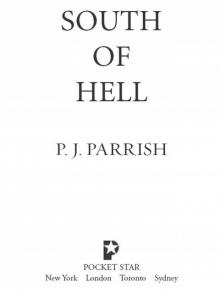 South of Hell (Louis Kincaid Mysteries)
South of Hell (Louis Kincaid Mysteries)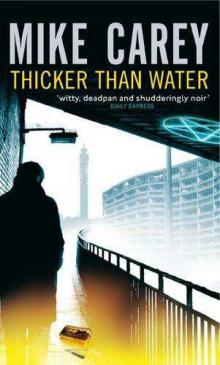 Thicker Than Water
Thicker Than Water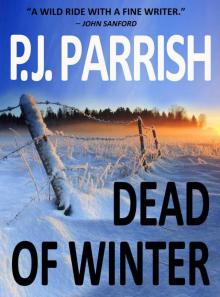 Dead of Winter
Dead of Winter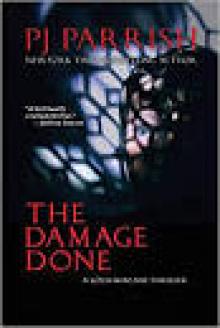 The Damage Done
The Damage Done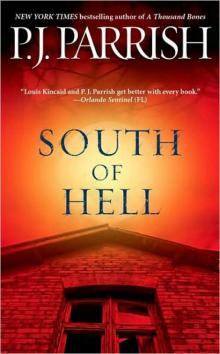 South Of Hell lk-9
South Of Hell lk-9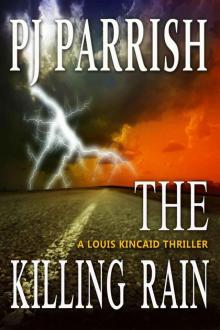 A Killing Rain
A Killing Rain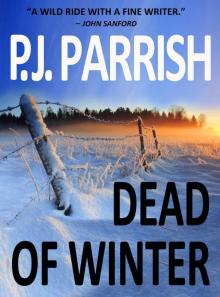 Dead of Winter lk-2
Dead of Winter lk-2 Island of Bones
Island of Bones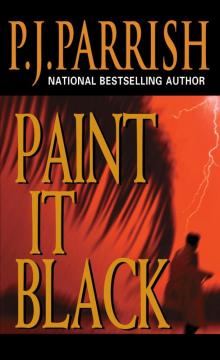 Paint It Black
Paint It Black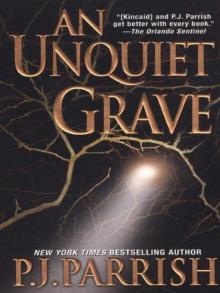 An Unquiet Grave (Louis Kincaid Mysteries)
An Unquiet Grave (Louis Kincaid Mysteries) She's Not There
She's Not There